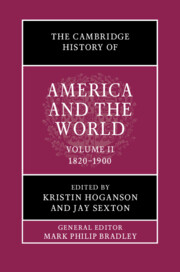Book contents
- The Cambridge History of America and the World
- The Cambridge History of America and the World
- The Cambridge History of America and the World
- Copyright page
- Contents
- Figures
- Maps
- Tables
- Contributors to Volume II
- General Introduction: What is America and the World?
- Introduction to Volume II
- Part I Building and Resisting US Empire
- 1 The United States between Nation and Empire, 1776–1820
- 2 Indigenous Nations and the United States
- 3 Settler Colonialism
- 4 Slavery and Statecraft
- 5 The Mexican-American War
- 6 Containing Empire: The United States and the World in the Civil War Era
- 7 The United States in an Age of Global Integration, 1865–1897
- 8 The Wars of 1898 and the US Overseas Empire
- Part II Imperial Structures
- Part III Americans and the World
- Part IV Americans in the World
- Index
1 - The United States between Nation and Empire, 1776–1820
from Part I - Building and Resisting US Empire
Published online by Cambridge University Press: 12 November 2021
- The Cambridge History of America and the World
- The Cambridge History of America and the World
- The Cambridge History of America and the World
- Copyright page
- Contents
- Figures
- Maps
- Tables
- Contributors to Volume II
- General Introduction: What is America and the World?
- Introduction to Volume II
- Part I Building and Resisting US Empire
- 1 The United States between Nation and Empire, 1776–1820
- 2 Indigenous Nations and the United States
- 3 Settler Colonialism
- 4 Slavery and Statecraft
- 5 The Mexican-American War
- 6 Containing Empire: The United States and the World in the Civil War Era
- 7 The United States in an Age of Global Integration, 1865–1897
- 8 The Wars of 1898 and the US Overseas Empire
- Part II Imperial Structures
- Part III Americans and the World
- Part IV Americans in the World
- Index
Summary
What was the place of the United States in the world at the start of the nineteenth century? The American republic that emerged from the Revolutionary War was keenly aware of its fragility on the world stage and its particular vulnerability within North America. European nations retained vast territorial claims and chafed at the insolence of American independence; Native American nations confounded the boasts of early US politicians that the liberality of American statesmen was the only check on westward expansion. The political elite of the Founding era insisted that the United States would create a new order, but their visions of American development were keenly attuned to the emerging political systems of Europe and the wider world.
- Type
- Chapter
- Information
- The Cambridge History of America and the World , pp. 35 - 59Publisher: Cambridge University PressPrint publication year: 2022

